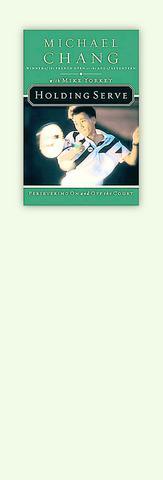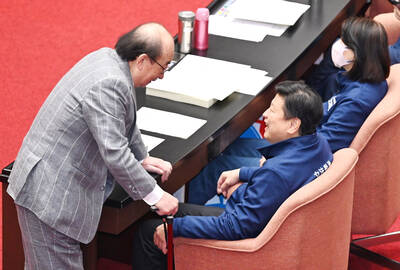What are we to say about Michael Chang? Who was that 17-year old David who stood so placidly on Center Court at the French Open in 1989, waiting for Ivan Lendl, the mighty Goliath, to serve? "Watch him when a call goes against him," wrote the Los Angeles Times later that year. "He just bows his head, bounces the ball twice, raises his racket, serves. No outbursts. No shrieks. He never approaches the chair, the neck cords standing out in his throat, his face red, his language X-rated ... Michael has had a variety of tennis instructors over the years, but the four he relies on most are Matthew, Mark, Luke and John."
Holding Serve, written with the help of Mike Yorkey, doesn't provide any answers to the enigma. But what it does is remind us that humanity is a strange species, and there are more kinds of being walking this earth than we might sometimes care to think. Michael Chang was, at 15, the youngest player ever to compete in Wimbledon. He was the youngest player ever to win a Grand Slam title. But that famous 1989 French Open has turned out to be the only Grand Slam he's ever won. It's as if he was born to be the boy David, and life's later conquests have somehow partially eluded him.
Consider this. When he traveled to distant championships in those early days, his mom went with him. They shared the same hotel room (to save on expenses), and she would cook up chicken noodles in the rice-cooker she always brought with her. Michael had a huge appetite, though he couldn't put on weight however hard he tried. He describes the night before the 1989 French Open final as follows: "That evening about 10pm, as Mom and I prepared to turn out the lights and go to sleep, I took out my New International Version Student Bible. I was in the habit of ending each day with 15 minutes of Bible reading. I liked to learn more about God and how much He loves us."

He reads King Solomon's Proverbs and in saying his prayers remembers "the Chinese people during the difficult time following the tragedy of Tiananmen Square" (which had occurred only days before). His final words are, "Goodnight, Mommy."
But the huge, the enormous paradox is that this pious middle-class son of Chinese immigrants, raised on the public courts of Southern California, won the French Open for the US after 494 other Americans -- some of them, no doubt, beer-swilling, loud-mouthed, sexually voracious -- had failed. No American male had managed to win the championship, played on its infamous red clay courts, since 1955, 24 years earlier. And who won? A 17-year old Christian, with eyes only for his Mommy with her chicken noodles, and his Student Bible. Even the name is significant. He's not Mike Chang or Mick Chang. He's Michael. And there he stands, waiting to receive serve, patient, unruffled, unperturbed, and ultimately, it would seem, inscrutable.
Sex is at the heart of it, of course, or rather the lack of it. What makes this boy tick, you ask, when he's so different from your average tough-guy sportsman, yet managed to beat them all at their own game? Michael Chang is disarmingly open about it in this book. He's still a virgin at 31, he writes, and saving himself for his eventual wife. She'll be of Chinese origin, he thinks, probably a Chinese American, and she'll be a Christian like him. Then on their wedding night he'll give her what will be hers alone, a gift no other woman on earth has ever known. So in the mean time Michael lives in his lake-side home outside Seattle, driving his boat to where he most likes to fish, reading his Bible, and wondering what to do now that his tennis career is coming to a close.
Something for God, he thinks. Impressing the young with his extraordinary tennis prowess and celebrity, you imagine, and at the same time suggesting they come along with him to the church to pray. Possibly, he speculates, in China.
As he comes over in this unassuming book, Michael Chang is innocence personified. He wasn't a high achiever at school, and he accepts life and the world in ways that his smarter contemporaries might bridle at.
Even money doesn't appear to bother him much, though that his winner's check for US$291,752 in Paris in 1989 more than doubled his career earnings isn't surprising for a 17 year-old. He just thanks God for all his blessings in his prayers every night, after he's prayed for his Mom and his family. He never asks God to let him win, though. God has his plans, knows what's best for him and for the world, and Michael doesn't presume to ask him to change them. Michael Chang is a distinctly American phenomenon.
D.H. Lawrence, writing in Studies in Classic American Literature considered America a place of innocence, but an innocence the world needed to renew itself. Lawrence himself moved to New Mexico for just that input, just that inspiration. Europe was over-sophisticated and tired, he thought. New things wouldn't come from there. And Bible-reading Christianity is part of that American innocence. In France religious belief has long been associated with ultra-right wing politics. After cheering him following his victory over Lendl, his French fans turned to jeering when he attributed his victory to Jesus.
In the last analysis, Chang reminds us that the usual stereotypes don't account for all people. The teenager who lobbed an underarm serve to Lendl at a crucial juncture, so unnerving him that he went on to lose the point, had no smart plan. "I never thought twice about it," he writes. "I just did it."
Life, then, is a mystery -- or, if you prefer, a miracle. Michael Chang has an inner steadfastness, both as a tennis-player and as a man, that other people's incomprehension, and even hostility, can't even begin to shake.

On Jan. 17, Beijing announced that it would allow residents of Shanghai and Fujian Province to visit Taiwan. The two sides are still working out the details. President William Lai (賴清德) has been promoting cross-strait tourism, perhaps to soften the People’s Republic of China’s (PRC) attitudes, perhaps as a sop to international and local opinion leaders. Likely the latter, since many observers understand that the twin drivers of cross-strait tourism — the belief that Chinese tourists will bring money into Taiwan, and the belief that tourism will create better relations — are both false. CHINESE TOURISM PIPE DREAM Back in July

Taiwan doesn’t have a lot of railways, but its network has plenty of history. The government-owned entity that last year became the Taiwan Railway Corp (TRC) has been operating trains since 1891. During the 1895-1945 period of Japanese rule, the colonial government made huge investments in rail infrastructure. The northern port city of Keelung was connected to Kaohsiung in the south. New lines appeared in Pingtung, Yilan and the Hualien-Taitung region. Railway enthusiasts exploring Taiwan will find plenty to amuse themselves. Taipei will soon gain its second rail-themed museum. Elsewhere there’s a number of endearing branch lines and rolling-stock collections, some

Could Taiwan’s democracy be at risk? There is a lot of apocalyptic commentary right now suggesting that this is the case, but it is always a conspiracy by the other guys — our side is firmly on the side of protecting democracy and always has been, unlike them! The situation is nowhere near that bleak — yet. The concern is that the power struggle between the opposition Chinese Nationalist Party (KMT) and their now effectively pan-blue allies the Taiwan People’s Party (TPP) and the ruling Democratic Progressive Party (DPP) intensifies to the point where democratic functions start to break down. Both

This was not supposed to be an election year. The local media is billing it as the “2025 great recall era” (2025大罷免時代) or the “2025 great recall wave” (2025大罷免潮), with many now just shortening it to “great recall.” As of this writing the number of campaigns that have submitted the requisite one percent of eligible voters signatures in legislative districts is 51 — 35 targeting Chinese Nationalist Party (KMT) caucus lawmakers and 16 targeting Democratic Progressive Party (DPP) lawmakers. The pan-green side has more as they started earlier. Many recall campaigns are billing themselves as “Winter Bluebirds” after the “Bluebird Action”